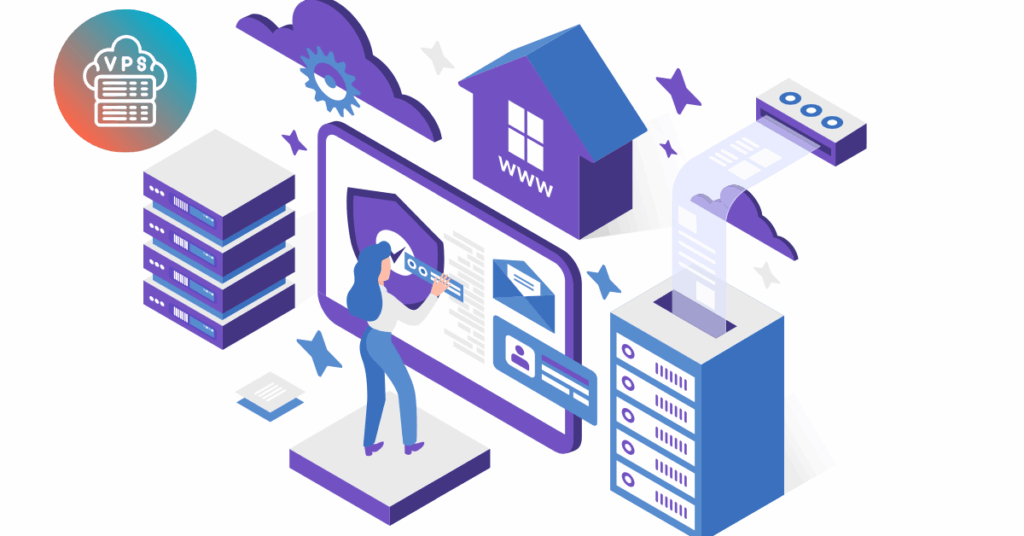Let’s compare VPS hosting Vs Dedicated hosting in Kenya.
In the world of web hosting, VPS hosting and dedicated hosting have emerged as two of the most popular options. While both offer a range of benefits, they also come with their own distinct advantages and disadvantages. Understanding the differences between VPS hosting and dedicated hosting is crucial in order to make an informed decision that aligns with your specific needs.
VPS Hosting
VPS hosting, or virtual private server hosting, involves hosting your website on a physical server alongside other websites. However, the use of virtualization technology ensures that your website remains isolated from the others on the server. This isolation provides you with dedicated resources, including CPU, RAM, and storage space. VPS hosting is an ideal choice for businesses that require more resources than shared hosting can offer but do not require the full capabilities of a dedicated server. It also grants businesses greater control over their hosting environment.
Benefits of VPS Hosting
1. More Resources: VPS hosting offers more resources than shared hosting, enabling your website to handle higher traffic volumes and perform better.
2. Increased Control: With VPS hosting, you enjoy greater control over your hosting environment. This allows you to install custom software, configure settings according to your preferences, and manage your own security.
3. Scalability: VPS hosting is easily scalable, enabling you to add more resources as your website grows.
Disadvantages of VPS Hosting
1. Cost: VPS hosting is more expensive than shared hosting, although it is less costly than dedicated hosting.
2. Performance: The performance of your website may be affected by other websites on the same server, as resources are shared.
3. Security: As a VPS hosting user, you are responsible for ensuring the security of your website. This entails installing appropriate security software and regularly updating your software to stay protected.
Dedicated Hosting
Dedicated hosting entails renting an entire physical server exclusively for your website. Dedicated hosting gives you complete access to the server’s resources, including CPU, RAM, storage space, and bandwidth. This type of hosting is particularly well-suited for businesses that require optimal levels of performance, security, and control. It is also beneficial for businesses hosting multiple websites or applications on the same server.
Benefits of Dedicated Hosting
1. Maximum Performance: Dedicated hosting provides the highest level of performance possible for your website, as you have exclusive access to the server’s resources.
2. Maximum Security: With dedicated hosting, you have complete control over the security measures implemented for your website on the server.
3. Maximum Control: Dedicated hosting offers unparalleled control over the configuration of your hosting environment, allowing you to customize it according to your precise requirements.
Disadvantages of Dedicated Hosting
1. Cost: Dedicated hosting is the most expensive type of web hosting, as you rent an entire server solely for your website.
2. Complexity: Managing a dedicated server can be complex, requiring technical expertise and knowledge.
3. Overkill: For some businesses, dedicated hosting may be excessive in terms of their needs, particularly if they do not require the highest levels of performance or control.
Choosing the Right Hosting Type
Determining the most suitable hosting type for your website depends on your specific needs and budget. If you require the utmost performance, security, and control, dedicated hosting is the ideal choice. However, if you are on a budget or do not necessitate the absolute maximum performance, VPS hosting offers a cost-effective alternative.
To summarize the key differences between VPS hosting and dedicated hosting, refer to the following table:
| Feature | VPS Hosting | Dedicated Hosting |
|---|---|---|
| Resources | Shared with other websites | Dedicated to your website |
| Cost | Less expensive | More expensive |
| Performance | Good | Excellent |
| Security | Good | Excellent |
| Control | More control than shared hosting, less control than dedicated hosting | Full control |
| Scalability | Scalable | Scalable |
| Complexity | Less complex than dedicated hosting | More complex than VPS hosting |
| Management | Some management required | No management required |
Resources
VPS hosting: In VPS hosting, your website shares resources with other websites on the same physical server. While you have dedicated resources allocated to your website, it may not always have access to the full capacity of the server. The performance of your website can be influenced by the resource usage of other websites sharing the server.
Dedicated hosting: With dedicated hosting, you rent an entire physical server exclusively for your website. This means your website has exclusive access to all the resources of the server. No other websites will impact the performance or resource availability of your website.
Performance
VPS hosting: The performance of a VPS website depends on the amount of allocated resources. If your website has sufficient resources, it will perform well. However, if your website is allocated limited resources, its performance may be affected, especially during periods of high traffic or resource-intensive tasks.
Dedicated hosting: Dedicated hosting ensures consistently good performance since your website has exclusive access to all the resources of the server. With no resource sharing, your website can handle heavy traffic and demanding applications without performance bottlenecks.
Scalability
VPS hosting: VPS hosting is designed to be scalable, allowing you to easily add more resources as your website grows. This scalability ensures your website can handle increased traffic and resource demands, maintaining optimal performance as your popularity expands.
Dedicated hosting: Similar to VPS hosting, dedicated hosting is scalable. However, scaling a dedicated server can be more complex compared to a VPS. It may require hardware upgrades or server reconfiguration, depending on the hosting provider and the level of scalability you require.
Cost
VPS hosting: VPS hosting is generally more cost-effective than dedicated hosting. Since you are sharing the cost of the physical server with other websites, you only pay for the resources you need. This makes it an attractive option for businesses with moderate budgets that require better performance than shared hosting.
Dedicated hosting: Dedicated hosting is the most expensive hosting option. However, it offers the highest levels of performance, security, and control. It is suitable for businesses with specific requirements, higher resource needs, or stringent security and compliance standards.
Security
VPS hosting: VPS hosting provides a certain level of security as your website is isolated from others on the same physical server. However, you are responsible for ensuring the security of your website. It’s essential to install security software, apply regular updates, and implement best practices to protect your website from potential vulnerabilities.
Dedicated hosting: Dedicated hosting offers enhanced security since you have complete control over the server. You can implement robust security measures, customize firewall configurations, and choose specific security software tailored to your website’s needs. This level of control allows you to strengthen your website’s defenses against potential threats.
Control
VPS hosting: VPS hosting offers more control than shared hosting. You have the freedom to install your preferred software, configure settings, and manage security measures. However, you don’t have complete control over the physical server itself, as it is shared with other websites.
Dedicated hosting: Dedicated hosting provides the highest level of control. You have complete control over the physical server, allowing you to tailor the server environment to your specific requirements. This level of control extends to
software installations, server configurations, and fine-tuning performance.
Management
VPS hosting: VPS hosting is relatively easy to manage. Most hosting providers offer user-friendly control panels that simplify the management process. These control panels provide intuitive interfaces for tasks such as managing domains, databases, and email accounts, making it accessible even for users with limited technical expertise.
Dedicated hosting: Managing a dedicated server is more complex compared to VPS hosting. Since you have full control over the server, you need to have knowledge of server administration, system updates, security configurations, and overall server maintenance. This level of management typically requires more technical expertise or dedicated IT support.
Complexity
VPS hosting: VPS hosting is less complex than dedicated hosting. Since you are sharing resources with a limited number of websites and don’t have to manage the physical server, the complexity is relatively lower. This makes it a viable option for businesses seeking a balance between control and simplicity.
Dedicated hosting: Dedicated hosting is more complex due to its exclusive resource allocation and complete server management. You are solely responsible for the server’s configuration, performance optimization, and troubleshooting. This level of complexity requires a deeper understanding of server administration and can be more suitable for businesses with experienced IT personnel or the resources to outsource server management.
Read also: The Pros and Cons of Shared Hosting vs. VPS Hosting
Final Thoughts on VPS Hosting Vs Dedicated Hosting in Kenya
In the VPS hosting vs. dedicated hosting debate, understanding the differences is crucial in making an informed decision.
VPS hosting offers a cost-effective solution with a balance between performance, control, and scalability. It is suitable for businesses with moderate resource demands and budgets.
On the other hand, dedicated hosting provides unparalleled performance, security, and control, making it ideal for resource-intensive websites or businesses that require maximum control and customization.
Consider your specific needs, budget, and growth plans when selecting a hosting solution. Evaluate the benefits and trade-offs of each hosting type, and consult with reputable hosting providers to ensure you choose the most suitable option for your website.
Remember, the right hosting solution can significantly impact your website’s performance, security, and user experience, so choose wisely.






